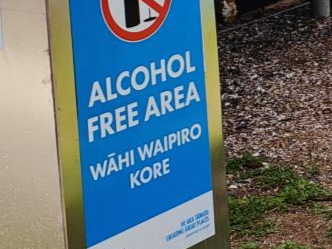Alcohol Control Bylaw

This consultation has now closed. Submissions were open for 4 weeks from Monday 20 November to Monday 18 December. Following consultation, on 14 March 2024 the council agreed to continue the Alcohol Control Bylaw without amendment.
We are seeking feedback on continuing the Alcohol Control Bylaw, which allows the council to maintain control areas where alcohol bans apply.
The purpose of the bylaw is to reduce crime, disorder and incidents of harm due to the consumption of alcohol in public places.
There are currently 23 alcohol control areas in the Far North. Maintaining the Alcohol Control Bylaw will allow the current alcohol control areas to continue to exist. We need your feedback on whether the bylaw should continue to apply.
You can read more information about the proposed new bylaw in the Proposal to Continue the Alcohol Control Bylaw.
No, we are only asking whether or not we should have the Alcohol Control Bylaw. Our plan is to separately review the alcohol control areas in 2024.
The purpose of the Alcohol Control Bylaw is to address problems of crime, disorder and incidents of harm associated with the consumption, bringing in and possession of alcohol in public places. The bylaw allows the council to establish alcohol control areas where alcohol bans apply. These areas are where high levels of crime and disorder have occurred relating to the consumption of alcohol in public.
The Alcohol Control Bylaw is enforced by the Police. Within the alcohol control areas, Police have the power to:
- Search peoples’ vehicles, bags and packages for alcohol
- Seize and remove any alcohol
- Ask offenders to leave an alcohol control area
- Issue infringement notices to offenders with a fine of $250
- Arrest those who commit offences or refuse to comply with police requests.
The Police have complete discretion to enforce the bylaw. They are not obliged to act if they witness alcohol consumption which they do not consider involves actual or potential alcohol-related crime and disorder.
Currently there are 23 alcohol control areas in the district where alcohol bans apply, either all year round or during the Christmas holiday period: Ahipara, Coopers Beach Reserve, Haruru Falls, Hihi, Kaeo, Kaikohe, Kaitaia, Kawakawa, Kerikeri, Kohukohu, Lily Pond, Moerewa, Okaihau, Omapere, Opononi, Paihia, Pukenui, Rawene, Russell, Taipa, Taupo Bay, Tokerau Beach, and Waipapa.
In 2024, the council plans to review these areas.
Government legislation requires the Alcohol Control Bylaw to be reviewed 5 years after it was first made in 2018. Once this review is complete, the bylaw will not need to be reviewed again until December 2033.
The council believes that the Alcohol Control Bylaw should continue without amendment for the following reasons:
- To address public safety – alcohol bans in public places can enhance public safety by reducing the likelihood of public intoxication, violence, and accidents caused by alcohol impairment
- To support the council’s community outcome of ‘Communities that are healthy, safe, connected and sustainable’
- To target problem areas – the bylaw applies alcohol bans in alcohol control areas where and when a high level of alcohol-related crime and disorder is known to have taken place in the past
- To prevent problems escalating – the bylaw enables the Police to act early to prevent alcohol-related problems escalating in public places
- A quick and instant tool for the police – the bylaw gives the Police enforcement powers that are more instant and less time-consuming to apply than other options such as charging offenders under the Summary Offences Act 1981
- A discretionary tool – Police have discretion to ignore the consumption of alcohol in public places if this is peaceful and orderly. If they decide to act, they can match their response to the seriousness of the situation, from issuing a warning at one end of the scale to arresting offenders at the other end
- Continuing the bylaw is strongly supported by the Police and Te Whatu Ora (Ngā Tai Ora – Public Health Northland)

